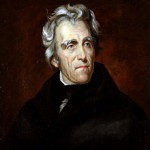
Morale Building Quotes from Andrew Jackson:
“Any man worth his salt will stick up for what he believes is right, but it takes a slightly better man to acknowledge instantly and without reservation that he is in error.”
More
“War is a blessing compared with national degradation.”
“Take the time to deliberate, but when the time for action arrives, stop thinking and go in.”
“You must pay the price if you wish to receive the blessing.”
 Andrew Jackson was born on March 15, 1767, in the Waxhaws region between North Carolina and South Carolina. A lawyer and a landowner, he became a national war hero after defeating the British in New Orleans during the War of 1812. Jackson was elected the seventh president of the United States in 1828. Known as the “people’s president,” Jackson destroyed the National Bank, founded the Democratic Party and is known for his support of individual liberty. He died on June 8, 1845.
Andrew Jackson was born on March 15, 1767, in the Waxhaws region between North Carolina and South Carolina. A lawyer and a landowner, he became a national war hero after defeating the British in New Orleans during the War of 1812. Jackson was elected the seventh president of the United States in 1828. Known as the “people’s president,” Jackson destroyed the National Bank, founded the Democratic Party and is known for his support of individual liberty. He died on June 8, 1845.
Andrew Jackson was born on March 15, 1767, to Andrew and Elizabeth Hutchinson Jackson, Scots-Irish colonists who emigrated from Ireland in 1765. Though his birthplace is presumed to have been at one of his uncles’ houses in the Waxhaws region that straddles North Carolina and South Carolina, the exact location is unknown—Jackson’s mother was making a trip across the Appalachian Mountains after burying her husband, who died three weeks before his son was born.
Growing up in that area, Jackson received an erratic education. At age 13, he joined a local militia and served as a courier during the Revolutionary War. His older brother, Hugh, died in the Battle of Stono Ferry in 1779, and Andrew and his brother Robert were captured by the British. While in captivity the brothers contracted smallpox, from which Robert did not recover. A few days after the brothers were released by British authorities, Robert died. Not long after his brother’s death, in November 1779, Jackson’s mother died of cholera. At the age of 14, he was orphaned.
Raised by his uncles, Jackson began studying law in Salisbury, North Carolina, in his late teens. In 1787, he was admitted to the bar and became a lawyer in Jonesborough, an area that is now part of Tennessee.
In 1796, Jackson was a member of the convention that established the Tennessee Constitution and, that same year, was elected Tennessee’s first representative in the U.S. House of Representative. He was elected to the Senate the following year, but resigned after serving only eight months. In 1798, Jackson was elected a judge of the Tennessee Supreme Court, serving in that position until 1804.
In addition to being a lawyer, politician and judge, Jackson was a landowner and a merchant. In 1804, he acquired an expansive plantation in Davidson County, Tennessee (near Nashville), called the Hermitage. He grew cotton, cultivated by a number of slaves, and soon became a member of the planting elite.
Jackson was appointed commander of the Tennessee militia in 1801. During the War of 1812 he led his troops to victory against the Creek Indians at Horseshoe Bend, killing some 800 warriors and procuring 20 million acres of land in present-day Georgia and Alabama. After this military success, Jackson was appointed major general.
After leading 5,000 soldiers in the defeat of 7,500 British in New Orleans, on January 8, 1815, Jackson was dubbed a national hero. He received the thanks of Congress and a gold medal. He was also popular among his troops, who said that Jackson was “as tough as old hickory wood” on the battlefield, earning him the nickname “Old Hickory.”
During the First Seminole War, in 1817, Jackson and his troops captured Pensacola, Florida (then a Spanish territory), and overthrew West Florida Governor José Masot, who had been secretly assisting the Indians in the war. Spain later ceded Florida to the United States by the Adams-Onis Treaty, and Jackson was named Florida’s military governor, a post that he held from March 1821 to December 1821.
In 1822, Jackson was re-elected to the U.S. Senate, and in 1824, state factions rallied around him and a Pennsylvania convention nominated him for the U.S. presidency. Though Jackson was the most popular candidate, he lost the election when the House of Representatives chose his opponent, John Quincy Adams. The decision, an alleged deal to give Adams the election in exchange for Henry Clay’s secretary of state seat, became known as the Corrupt Bargain. The negative reaction to the House’s decision resulted in Jackson’s renomination for the presidency in 1825, three years before the next election. It also split the Democratic-Republican Party in two.
Jackson won the presidential election of 1828 by a landslide, with John C. Calhoun as his vice-presidential running mate. Jackson’s opponents nicknamed him “jackass,” a moniker that Jackson took a liking to—so much that he decided to use the symbol of a donkey to represent himself. Though the use of that symbol died out, it would later become the emblem of the new Democratic Party.
Jackson was the first president to invite the public to attend the inauguration ball at the White House, which quickly earned him popularity. The crowd that arrived was so large that furniture and dishes were broken as people jostled one another to get a look at the president. The event earned Jackson the nickname “King Mob.”
Jackson did not submit to Congress in policy-making, but was the first president to assume command with his power to veto. He believed in giving the power to elect the president and vice president to the American people by abolishing the electoral college, garnering him the nickname the “people’s president.” He also implemented the theory of rotation in office, which became known as the spoils system.
Perhaps his greatest feat as president, Jackson became involved in a battle with the Second Bank of the United States, a theoretically private corporation that actually served as a government-sponsored monopoly. Jackson openly displayed his hostility toward the bank, vetoing its re-charter bill and charging it with disproportionate economic privilege. The American public supported his views on the issue, and in 1832, Jackson won his re-election campaign against Henry Clay; he won his second term with 56 percent of the popular vote, and nearly five times as many electoral votes.
Despite his popularity and success, Jackson’s presidency was not without its controversies. One particularly troubling aspect of it was his dealings with Native Americans: Though Jackson had negotiated treaties and removal policies long before his presidency, historians often lay blame with him for sufferings such as the Trail of Tears, the forced relocation westward of an estimated 15,000 Cherokee Indians.
When Jackson arrived in Nashville in 1788, he met Rachel Donelson Robards, who, at the time, was unhappily married to but separated from Captain Lewis Robards. Rachel and Jackson married before her divorce was officially complete—a fact that was later brought to light during Jackson’s first presidential campaign, garnering accusations of bigamy by the press. Jackson’s willingness to engage his and his wife’s many attackers earned him a reputation as a quarrelsome man. During one incident, Jackson even challenged one accuser, Charles Dickinson, to a duel, and won.
The Jacksons had three adopted sons: Theodore, an Indian orphan; Andrew Jackson Jr., the son of Rachel’s brother Severn Donelson; and Lyncoya, a Creek Indian orphan.
On December 22, 1828, two months before Jackson’s presidential inauguration, Rachel died of a heart attack. She was buried two days later, on Christmas Eve.
After completing his second term in the White House, Jackson returned to the Hermitage, where he died of lead poisoning caused by two bullets that had remained in his chest for several years on June 8, 1845, at the age of 78.
Jackson continues to be widely regarded as one of the most influential U.S. presidents in history, as well as one of the most aggressive and controversial. His ardent support of individual liberty effected political and governmental change, including many prominent and lasting national policies.

